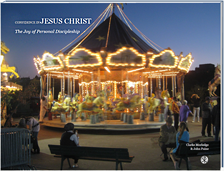What are the great principles that guide historically Protestant, Evangelical Christianity? They can be summarized by considering the “five solas,” five Latin phrases, that define the very heart of the 16th century Reformation.
Five hundred years after the beginning of the Protestant Reformation, the place of the Gospel in the church is just as tenuous as ever. Every generation must diligently seek to recover the Gospel anew, lest it be lost in a sea of religiosity, theology “fads,” and the indifference of hearts calloused towards the Truth. The first three “solas” were watchwords of the 16th century, and the last two “solas” have been adopted over time.
What do you believe?
Sola Scripture: Scripture alone is the final authority, in all matters of Christian faith and practice. The Western medieval church tended to rely on church leaders and councils, that sometimes obscured the teaching of Scripture. Folks like the German Reformer, Martin Luther, have placed the Bible, and the Bible alone, at the fountainhead of all spiritual authority, over against human traditions. Church tradition does play a role in our understanding of the Bible, but it should never cancel out the Bible itself.
Sola Fide: Salvation is experienced through faith, and faith alone, and not through works. Yet as John Calvin, the 16th century French/Swiss Reformer, is said by some to have remarked, “Faith alone justifies, and yet the faith that justifies is never alone.” Good works will always accompany genuine faith in Christ.
Sola Gratia: By “grace alone” we are saved. The Western medieval church, over a period of centuries, was drawn to the idea that while salvation is indeed through grace, that grace could only be mediated through the sacraments of the institutional church. The 16th century Reformers contended that while the sacraments, instituted by Christ are indeed important, the church, as an institution, does not control the means by which people receive the grace of God. The Gospel is bigger than that.
Sola Christus: Christ is the sole mediator between humans and God. Martin Luther championed the idea of the “priesthood of all believers,” that human beings can have direct access to God, through Christ, without having to pass through a human, priestly go-between.
Sola Deo Gloria: When it comes to salvation, who gets the glory? Does God alone receive it, or does human effort dilute the praise that belongs solely to God? The Reformation endeavored to see that God, and God alone, is supremely honored.
My Roman Catholic and Eastern Orthodox friends might prod and question some, if not all, of the “five solas.” But the discussion is an important one for all Christians to have.
Are these “five solas” hallmarks in your life? Do they define for you, the basic theological principles supporting the truth of the Gospel? What do you believe?


